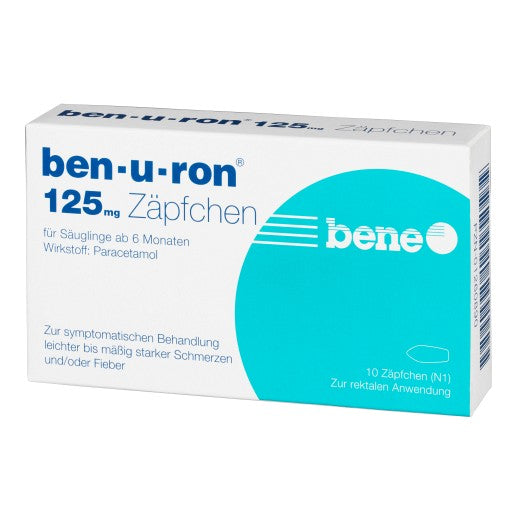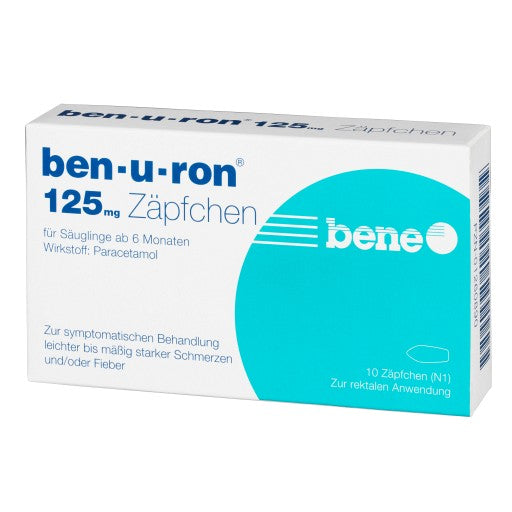- Sku: 01260890
- Vendor: bene Arzneimittel GmbH
BEN-U-RON 125 mg suppositories
order safely & quickly
Fast & reliable shipping with DHL
- pain-relieving, antipyretic medicine (analgesic and antipyretic)
- The preparation is used for the symptomatic treatment of
- slight to moderate pain
- Fever
- The drug must not be used
- if you are hypersensitive (allergic) to paracetamol or any of the other ingredients
- if you suffer from severe impairment of liver function
- Always use the medicine exactly as directed. Please ask your doctor or pharmacist if you are not sure.
- The dosage depends on the following information. Paracetamol is dosed depending on body weight and age, usually with 10 to 15 mg/kg body weight as a single dose, up to a maximum of 60 mg/kg body weight as a total daily dose.
- The respective dosage interval depends on the symptoms and the maximum total daily dose.
- It should not be less than 6 hours.
- If symptoms last longer than 3 days, a doctor should be consulted.
- Body weight or age: 7 kg - 8 kg; 6 - 9 months
- Single dose in number of suppositories (corresponding paracetamol dose): 1 suppository (corresponding to 125 mg paracetamol)
- Maximum daily dose (24 hours) in number of suppositories (corresponding paracetamol dose): 3 suppositories (corresponding to 375 mg paracetamol)
- Body weight or age: 9 kg - 12 kg; 9 months - 2 years
- Single dose in number of suppositories (corresponding paracetamol dose): 1 suppository (corresponding to 125 mg paracetamol)
- Maximum daily dose (24 hours) in number of suppositories (corresponding paracetamol dose): 4 suppositories (corresponding to 500 mg paracetamol)
- Duration of application
- Do not use the medicine for longer than 3 days without medical or dental advice.
- Special patient groups
- Liver dysfunction and mild impairment of kidney function
- In patients with liver or kidney dysfunction or Gilbert's syndrome, the dose must be reduced or the dose interval extended.
- Patients with severe renal impairment
- In cases of severe renal insufficiency (creatinine clearance < 10 ml/min), a dosage interval of at least 8 hours must be maintained.
- Elderly patients
- No special dose adjustment is required.
- Children
- Use of the drug in children under 6 months or under 7 kg body weight is not recommended because the dosage strength is not suitable for this group of patients. However, suitable dosage strengths and dosage forms are available for this patient group.
- Please talk to your doctor or pharmacist if you have the impression that the effect of the medicine is too strong or too weak.
- Liver dysfunction and mild impairment of kidney function
- If you have used more than you should
- Symptoms of overdose include nausea, vomiting, loss of appetite, pallor, and abdominal pain, generally occurring within 24 hours.
- If more medicine has been used than recommended, call a doctor for help!
- If you forget to use it
- Do not apply a double dose to make up for a forgotten application.
- If you have any further questions about using the medicine, ask your doctor or pharmacist.
- Like all medicines, this preparation can cause side effects, although not everyone gets them.
- When evaluating side effects, the following frequency information is used:
- very often more than 1 in 10 people treated
- often affects 1 to 10 users in 100
- occasionally affects 1 to 10 users in 1,000
- rarely affects 1 to 10 users in 10,000
- very rarely affects less than 1 in 10,000 people
- not known Frequency cannot be estimated from the available data
- Liver and biliary diseases
- Rare: Slight increase in certain liver enzymes (serum transaminases).
- Immune system diseases
- Very rare: Allergic reactions in the form of a simple skin rash or hives, swelling of the face, tongue and larynx (Quincke's edema) or even a shock reaction.
- In the event of an allergic shock reaction, call the nearest available doctor for help. A narrowing of the airways (analgesic asthma) has been triggered in sensitive people.
- Diseases of the blood and lymphatic system
- Very rare: Changes in blood counts such as a reduced number of blood platelets (thrombocytopenia) or a severe reduction in certain white blood cells (agranulocytosis).
- Please inform your doctor or pharmacist if any of the side effects listed seriously affects you or if you notice side effects that are not listed.
- Special care is required when using the drug
- if you are a chronic alcoholic
- if you suffer from impaired liver function (hepatitis, Gilbert's syndrome)
- with previously damaged kidneys
- If your symptoms worsen or do not improve after 3 days, or if you have a high fever, you must see a doctor.
- To prevent the risk of overdose, it should be ensured that other medicines used at the same time do not contain paracetamol.
- Long-term, high-dose, improper use of painkillers can cause headaches, which should not be treated with increased doses of the drug.
- In general, the habitual use of painkillers, especially when several painkilling agents are combined, can lead to permanent kidney damage with the risk of kidney failure (analgesic nephropathy).
- If painkillers are stopped abruptly after prolonged, high-dose, improper use, headaches as well as fatigue, muscle pain, nervousness and vegetative symptoms may occur. The withdrawal symptoms subside within a few days. Until then, painkillers should not be used again and should not be used again without medical advice.
- Do not use the product for a long time or in higher doses without medical or dental advice.
- Ability to drive and use machines
- The medicine has no influence on the ability to drive or use machines.
- Nevertheless, caution should always be exercised after using a painkiller.
- Before taking/using any medicines, ask your doctor or pharmacist for advice.
- The preparation should only be used during pregnancy after careful consideration of the benefit-risk ratio. You should not use the medicine during pregnancy for a long time, in high doses or in combination with other medicines, as the safety of use in these cases has not been proven.
- Paracetamol passes into breast milk. Since there are no known adverse consequences for the infant, interrupting breastfeeding is usually not necessary.
- If possible, the medicine is inserted deep into the anus after a bowel movement. To improve lubricity, warm the suppositories in your hand or dip them briefly in warm water.
- When using the preparation with other medicines
- Please inform your doctor or pharmacist if you are taking or have recently taken any other medicines, even if they are non-prescription medicines.
- Interactions are possible with:
- probenecid (medicine for gout)
- possible liver-damaging substances, e.g. B. Phenobarbital (sleeping pills), phenytoin, carbamazepine (medicines against epilepsy) and rifampicin (tuberculosis medicine). Under certain circumstances, simultaneous use can also lead to liver damage from otherwise harmless doses of the drug. The same applies to alcohol abuse.
- Medicines for HIV infections (zidovudine): The tendency to reduce white blood cells (neutropenia) is increased. The preparation should therefore only be used at the same time as zidovudine on medical advice.
- Anticoagulant medicines (oral anticoagulants, especially warfarin). Repeated use of paracetamol for more than a week increases the tendency to bleed. In this case, long-term use of paracetamol should only be carried out under medical supervision. Occasional use of paracetamol has no effect on bleeding tendency.
- Effects of the use of the drug on laboratory studies
- The uric acid determination and the blood sugar determination can be influenced.
- When using the preparation together with food and drinks
- The medicine must not be used or administered together with alcohol.
Mandatory information :

BEN-U-RON 125 mg suppositories
E-Rezept auf der Krankenkassenkarte? Apo-Versand App!
Jetzt kostenlos runterladen!
.png)
★★★★★ 5 / 5 (Sehr Gut)






